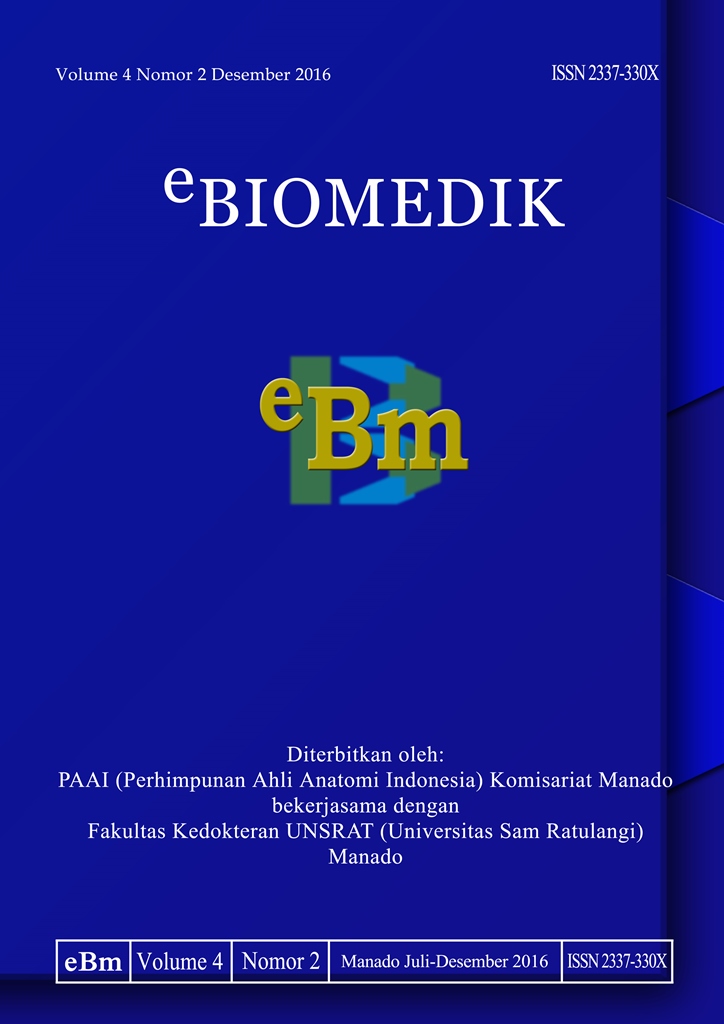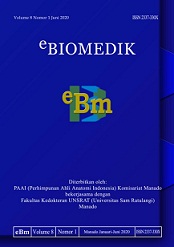Gambaran histopatologik hati tikus wistar (Rattus norveginus) yang diinduksi monosodium glutamate (msg) dan diberikan sari air bawang daun (Allium fistulosum L.)
DOI:
https://doi.org/10.35790/ebm.v4i2.14662Abstract
Abstract: Monosodium glutamate (MSG) has been consumed around the world as a food additive in the form of L-glutamic acid. The liver has glutamate receptors, hence its susceptibility to damage due to oxidative stress from consuming excessive MSG. Leek contain antioxidants such as flavonoid, which has potent hepatoprotective properties under certain liver conditions, for the example, oxidative stress, liver fibrosis, and fatty liver. This study aims to see the liver histopathologic findings of wistar rats (Ratus norvegicus) that has been induced by MSG and was given leek juice (Allium fistulosum L.). This was an experimental laboratory study, with 20 wistar rats as subjects. In this study, 173,6 mg per gram body of monosodium glutamate and 20 gram per kilogram body weight of leek juice are administered orally each day. Group A is the negative control group. Group B is given MSG for 14 days. Group C are given MSG for 14 days and were stopped for 5 days. Group D are given MSG for 14 days and were given leek juice. Group A shows normal liver histopathologic features. Group B shows liver cells damage in the form of inflammation and fatty cells. Group C shows regeneration of liver cells but a little bit of inflammation and fatty cells were still found, while in group D there is a wide regeneration of liver cells and there was barely any inflammation and fatty cells. Conclusion: Microscopic features of wistar rat liver after administration of monosodium glutamate for 14 day showed inflammation and fatty cells and then the administration of leek juice for 5 days after MSG administration oon wistar rat showed a wide regeneration of liver cells compared to no administration of leek juice.
Keywords: monosodium glutamate, leek, liver.
Â
Abstrak: Monosodium glutamate (MSG) telah dikonsumsi di seluruh dunia sebagai penambah rasa makanan dalam bentuk L-glutamic acid (asam glutamat). Hati memiliki resptor terhadap glutamate sehingga rentan mengalami kerusakan akibat stress oksidatif dari konsumsi MSG yang berlebihan. Bawang daun mengandung antioksidan seperti senyawa flavonoid yang memiliki aktivitas hepatoprotektif ampuh pada berbagai kondisi hati seperti strees oksidatif, fibrosis hati, dan perlemakan hati. Penelitian ini bertujuan untuk melihat gambaran histopatologik hati tikus wistar (Rattus norvegicus) yang diinduksi MSG dan diberikan sari air bawang daun (Allium fistulosum L.) Jenis penelitian ini eksperimental laboratorik. Subjek penelitian 20 ekor tikus wistar. Pada penelitian ini digunakan monosodium glutamate 173,6mg/gBB/hari dan sari air bawang daun 20g/kgBB/hari yang diberikan secara oral. Kelompok A (kontrol negatif). Kelompok B diberikan MSG selama 14 hari. Kelompok C diberikan MSG selama 14 hari dan dihentikan selama 5 hari. Kelompok D diberikan MSG selama 14 hari dan diberikan sari air bawang daun. Kelompok A memperlihatkan gambaran histopatologik sel hati normal. Kelompok B memperlihatkan hepatitis dan perlemakan sel hati (steatosis). Kelompok C memperlihatkan sel hati regenerasi namun masih terdapat sedikit sel radang dan perlemakan hati sedangkan pada kelompok D tampak sel hati regenerasi yang luas dan hampir tidak ditemukan peradangan dan perlemakan. Simpulan: Gambaran mikroskopik hati tikus wistar setelah pemberian monosodium glutamate selama 14 hari menunjukkan peradangan (hepatitis) dan perlemakan (steatosis mikrovesikular) kemudian pemberian sari air bawang daun selama 5 hari pasca pemberian MSG pada tikus wistar menunjukkan adanya regenerasi sel hati yang lebih luas dibandingkan dengan tanpa pemberian sari air bawang daun.
Kata kunci: monosodium glutamate, bawang daun, hati.





